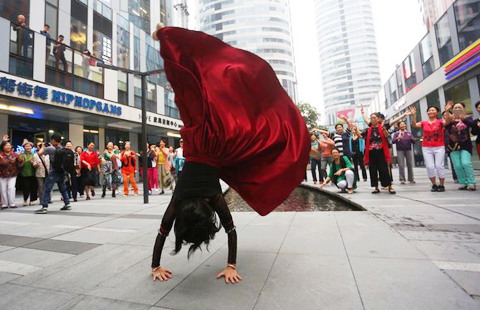World Bank weighs protest's economic impact
Updated: 2014-10-07 03:32
By Agence France-Presse and Xinhua(China Daily)
|
|||||||||||
Protests in Hong Kong could hurt the city's economy - as well as the Chinese mainland's - but the impact will depend on how long the "uncertainty" lasts, the World Bank's chief economist for Asia said on Monday.
Sudhir Shetty said the bank was closely monitoring events in Hong Kong, where thousands of protesters have paralyzed major streets for more than a week in a tense standoff with the government.
"Obviously we are looking very closely at the situation and following it and looking at its impact," he told reporters in Singapore.
"The impacts will be both on the Hong Kong Special Administrative Region itself - their economy - but also in terms of the broader impact on the Chinese economy.
"As of now, what we anticipate is obviously a greater impact on Hong Kong SAR - so slower growth in 2014 than was being anticipated earlier."
Shetty added that "at this stage, our best estimates ... are that there isn't as yet significant spillover to the broader Chinese economy".
The World Bank does not provide a forecast for Hong Kong's economic growth because it covers only developing economies.
"The only point I would make is that both the short-term impacts on growth, as well as the more medium-term impact on its role as a financial center, will depend, obviously, very much on how the current uncertainty plays out," Shetty said. "Uncertainty is not a good thing for economic activity."
Meanwhile, current and past politicians in different countries expressed their views on the Occupy Central movement in Hong Kong.
Charles Powell, who served as private secretary to then British prime minister Margaret Thatcher, said on Sunday he did not believe the protest would lead to a change.
"The position about elections has been clear since the law was published in 1991, and I don't believe for one moment that the Chinese are going to change that basic position," Powell told British BBC Radio 4's The World This Weekend.
"Hong Kong has always been part of China," Powell said. "We rented for a while, and we didn't introduce democracy."
Singapore's Foreign Minister K. Shanmugam said on Saturday that many news reports have intentionally ignored the fact that Hong Kong didn't have a democratic system under British rule for some 150 years. Beijing's plan gave Hong Kong more democratic space than what it had before, he said.
Related Stories
HK's reform must follow constitutional framework 2014-10-06 09:24
Pragmatism is what HK must pursue - not protests 2014-10-06 09:24
Handover 'brought democracy to HK' 2014-10-04 07:00
Firmly safeguard rule of law in HK: People's Daily 2014-10-04 02:02
Protests harm HK economy 2014-10-03 20:55
Critics lash out at protestors for jeopardizing HK's future 2014-10-03 20:53
Today's Top News
HK officials resume work as protests thin
Putting Chinese wines on the map
Brazil's Rousseff to face Neves in rival in runoff
Tall tale: scientists unravel the genetics of human height
British PM vows to hunt down IS killers
Mother with womb transplant says risk paid off
Manchester hosts Chinese contemporary art event
China to start direct yuan-euro trade
Hot Topics
Lunar probe , China growth forecasts, Emission rules get tougher, China seen through 'colored lens', International board,
Editor's Picks

|

|

|

|

|

|





